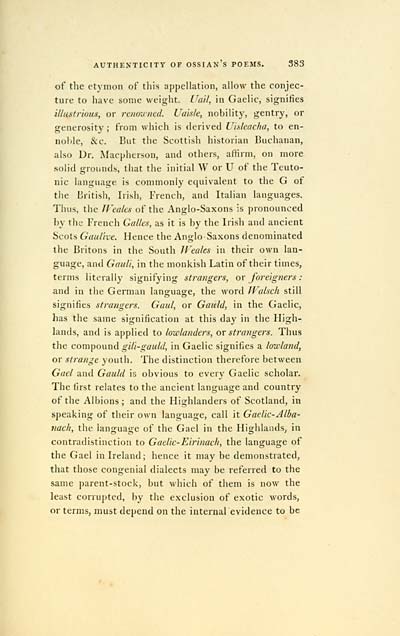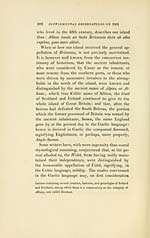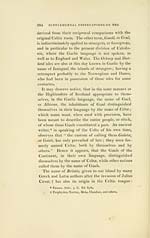J. F. Campbell Collection > Poems of Ossian > Volume 3
(395)
Download files
Complete book:
Individual page:
Thumbnail gallery: Grid view | List view

AUTHENTICITY OF OSSIAN's POEMS. 383
of the etyiiion of this appellation, allow the conjec-
ture to have sonie weight. Uail, iii Gaelic, signifìes
iUustrious, or rcnouned. Uaisle, nobility, gentry, or
generosity ; from which is derived Uisleacha, to en-
nohle, &c. But the Scottish historian Buchanan,
also Dr. Macpherson, and others, affirm, on more
solid grounds, tliat tlie initial W or U of the Teuto-
nic language is commonly equivalent to the G of
tlie British, Irish, French, and Italian languages.
Thus, tlie JVealcs of the Anglo-Saxons is pronounced
by tht; French Galles, as it is hy the Irish and ancient
Scots Gaulìve. Hence the Anglo Saxons denominated
the Britons in the South Jl'eales iu their own lan-
guage, and Gauli, in the monkish Latin of their times,
terms literally signifying strangers, or foreigners :
and in the German language, tlie word JVatsch still
signifies strangers. Gaul, or Gaitld, in the Gaehc,
has the same signification at this day in the High-
lands, and is applied to lowlanders, or strangers. Thus
the compound giU-gauld, in Gaelic signifies a lowland,
or strange youth. The distinction thercfore between
Gael and Gauld is obvious to every Gaehc scholar.
The first relates to the ancient language and country
of the Albions ; and the Highlanders of Scotland, in
speaking of tlieir own language, call it Gaelic-Alba-
ìiach, the language of the Gael in the Highlands, in
contradistinction to GaeUc-Eirinacìi, the language of
the Gael inlreland; hence it may be demonstrated,
that those congenial dialects may be referred to the
same parent-stock, but which of them is now the
least corrupted, by the exclusion of exotic words,
or terms, must depend on the internal evidence to be
of the etyiiion of this appellation, allow the conjec-
ture to have sonie weight. Uail, iii Gaelic, signifìes
iUustrious, or rcnouned. Uaisle, nobility, gentry, or
generosity ; from which is derived Uisleacha, to en-
nohle, &c. But the Scottish historian Buchanan,
also Dr. Macpherson, and others, affirm, on more
solid grounds, tliat tlie initial W or U of the Teuto-
nic language is commonly equivalent to the G of
tlie British, Irish, French, and Italian languages.
Thus, tlie JVealcs of the Anglo-Saxons is pronounced
by tht; French Galles, as it is hy the Irish and ancient
Scots Gaulìve. Hence the Anglo Saxons denominated
the Britons in the South Jl'eales iu their own lan-
guage, and Gauli, in the monkish Latin of their times,
terms literally signifying strangers, or foreigners :
and in the German language, tlie word JVatsch still
signifies strangers. Gaul, or Gaitld, in the Gaehc,
has the same signification at this day in the High-
lands, and is applied to lowlanders, or strangers. Thus
the compound giU-gauld, in Gaelic signifies a lowland,
or strange youth. The distinction thercfore between
Gael and Gauld is obvious to every Gaehc scholar.
The first relates to the ancient language and country
of the Albions ; and the Highlanders of Scotland, in
speaking of tlieir own language, call it Gaelic-Alba-
ìiach, the language of the Gael in the Highlands, in
contradistinction to GaeUc-Eirinacìi, the language of
the Gael inlreland; hence it may be demonstrated,
that those congenial dialects may be referred to the
same parent-stock, but which of them is now the
least corrupted, by the exclusion of exotic words,
or terms, must depend on the internal evidence to be
Set display mode to: Large image | Transcription
Images and transcriptions on this page, including medium image downloads, may be used under the Creative Commons Attribution 4.0 International Licence unless otherwise stated. ![]()
| Early Gaelic Book Collections > J. F. Campbell Collection > Poems of Ossian > Volume 3 > (395) |
|---|
| Permanent URL | https://digital.nls.uk/81286492 |
|---|
| Description | Vol. III. |
|---|---|
| Shelfmark | Cam.1.b.5 |
| Additional NLS resources: | |
| Attribution and copyright: |
|
| Description | Volumes from a collection of 610 books rich in Highland folklore, Ossianic literature and other Celtic subjects. Many of the books annotated by John Francis Campbell of Islay, who assembled the collection. |
|---|
| Description | Selected items from five 'Special and Named Printed Collections'. Includes books in Gaelic and other Celtic languages, works about the Gaels, their languages, literature, culture and history. |
|---|

